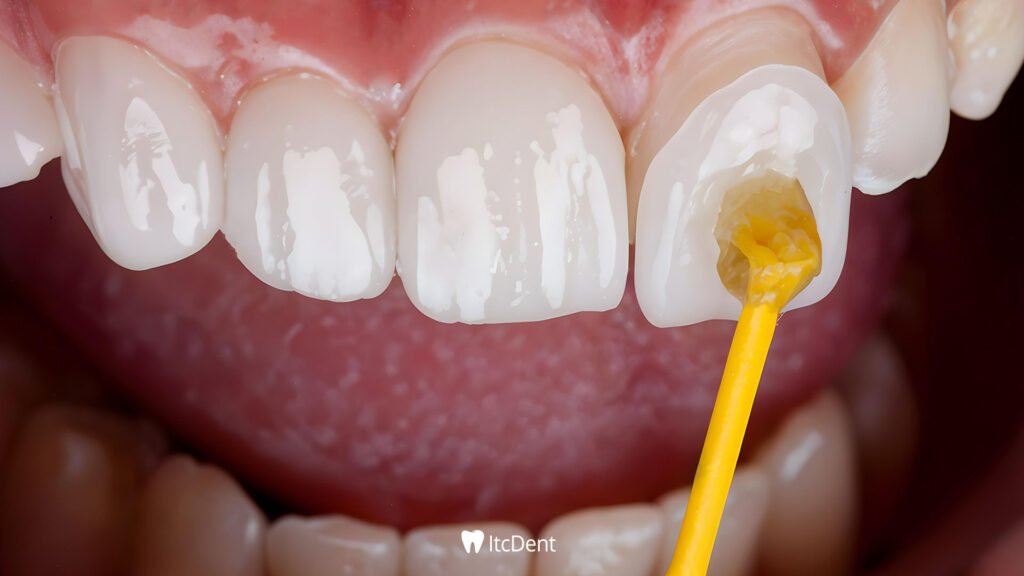Porcelain Teeth
Nowadays, the importance given to aesthetic appearance and oral health is increasing day by day. A dazzling smile is more than just a physical feature, it has become the key to self-confidence and success in social life. At this point, porcelain dental veneers, one of the innovative solutions offered by modern dentistry, appear as a prominent option in terms of both aesthetics and functionality.
Providing the result closest to the appearance of natural teeth, porcelain teeth offer a unique alternative in dental aesthetics with their durability, brightness and perfect fit to the tooth surface. This method provides both a permanent and aesthetic solution for individuals who have problems such as deformity, discoloration, wear or fracture in their teeth.
What is Porcelain Teeth?
Porcelain teeth are dental crowns made of ceramic or porcelain material that best imitate the natural tooth structure in terms of aesthetics and functionality. This innovative method offered by modern dentistry is preferred as an effective solution for tooth deformities, color changes, fractures, abrasions and other aesthetic problems.
These veneers are especially popular among individuals who want to improve the external appearance of their teeth. Offering an appearance that is extremely close to natural teeth, porcelain teeth provide a bright and healthy smile thanks to their light reflecting properties. Additionally, thanks to its high durability, it can be used without any problems for many years.
Porcelain teeth are applied not only for aesthetic concerns but also to support oral health. It responds to various needs such as correcting chewing functions, ensuring the harmony of teeth with each other and eliminating problems in the tooth structure.

Types of Porcelain Teeth
Porcelain dental veneers are divided into different types according to the aesthetic and functional needs of individuals. These types, each offering ideal solutions for certain situations, vary according to the materials used and application methods. Here are the most common types of porcelain teeth:
-Full Porcelain Crowns
Full porcelain crowns are a type that is produced entirely from porcelain and covers the entire surface of the teeth. These veneers are a durable and aesthetic solution that can be applied to both front and back teeth.
Full porcelain crowns, which give the result closest to the natural tooth appearance, are used to restore the tooth, especially in cases where a large part of the tooth is damaged. Thanks to its metal-free structure, it is a biocompatible option and fits perfectly with the gums. Providing a bright and natural appearance makes full porcelain crowns indispensable for individuals with high aesthetic sensitivity.
-Zirconium Supported Porcelain Veneers
Zirconium-supported porcelain veneers offer a perfect balance between durability and aesthetics. These veneers are created by placing porcelain on a substructure made of zirconium.
Zirconium is known for its high strength and biocompatible properties. Thanks to these features, it is especially preferred in the back teeth where chewing force is intense. It also provides an aesthetic close to the appearance of natural teeth, making zirconium-supported porcelain both a functional and aesthetic option. It is more durable and long-lasting than metal-supported porcelain.
-Porcelain Laminate Veneer
Porcelain laminate veneer is a type of veneer applied by placing a thin layer of porcelain only on the front surface of the teeth. This method is frequently preferred to remove yellowing of tooth color, correct the shape and size of teeth, or improve the appearance of gapped teeth.
During laminate veneer application, a minimum amount of material is removed from the tooth surface, which preserves the natural structure of the tooth to the maximum extent. Although they are extremely thin, they offer excellent aesthetic results thanks to their durability and light transmittance similar to natural teeth. It is an ideal option for individuals who want an aesthetic smile, especially on the front teeth.

Advantages
Porcelain dental veneers offer an aesthetic and functional solution with many advantages. Thanks to its light-permeable properties, it provides an appearance that is extremely similar to natural teeth, which allows for an excellent aesthetic result. Porcelain material, which is resistant to stains, is not affected by color changes caused by factors such as coffee, tea or cigarettes, thus offering long-term color durability.
When properly maintained, it is long-lasting and can be used for years without any problems. In addition, porcelain, being a biocompatible material, fits perfectly with the gums and minimizes the risk of allergic reactions. Providing an effective solution to eliminate aesthetic problems such as tooth fractures, color changes and deformities, makes porcelain dental veneers a preferred option in terms of both aesthetics and health.
How Are Porcelain Teeth Made?
Porcelain tooth application usually consists of several stages:
- Inspection and Planning
The first step is to assess the patient’s needs and examine the tooth structure. The dentist determines whether porcelain teeth are suitable and creates a treatment plan in line with the patient’s wishes. - Preparation
Teeth are prepared for crowning. At this stage, a thin layer is removed from the tooth surface. Then, teeth measurements are taken and sent to the laboratory. - Temporary Covering
While the porcelain tooth is being prepared, temporary coatings are applied to ensure the comfort of the patient. - Placing the Covering
The porcelain tooth prepared in the laboratory is fixed in place by the dentist with a special adhesive. - Final Checks
After the application is completed, the fit and appearance of the tooth is checked.

Porcelain Teeth Prices
The cost of porcelain dental treatment varies depending on the scope of the application, the type of material used and the needs of the patient. Depending on the aesthetic and functional problems in the teeth, factors such as the type of coating preferred, the details of the treatment process and the level of expertise of the dentist have an impact on the price.
In addition, different veneer options such as full porcelain, laminate veneer or zirconium-supported porcelain have different costs depending on the features and advantages each offers. A detailed examination before treatment is important for both determining needs and creating a treatment plan.
Porcelain dental veneers can be considered a valuable investment in the long term, considering the durability and aesthetic advantages they provide. It is recommended that you consult a dentist to get clearer information about the treatment process and costs.


